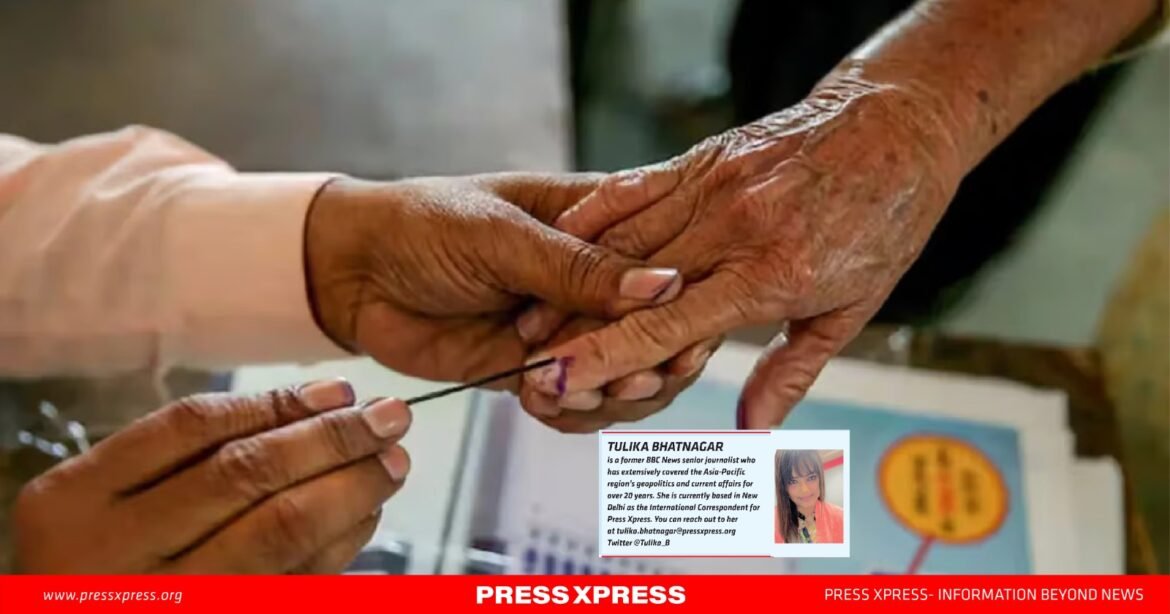India’s western state, Maharashtra is voting in a single phase today for all 288 members of the legislative assembly.
The state, richest in the country, boasts of projected INR 42.67 lakh crore Gross State Domestic Product (GSDP) for FY2024-25. GSDP is a measure of the total value of goods and services produced within a state’s borders over a specific period of time.
Interestingly, Jharkhand, the second poorest state in India, is also voting in its second phase today. The first phase of voting occurred on 13 November. It has 81 (+1 nominated) assembly seats in all.
Jharkhand has the second-highest proportion of Indians living in multidimensional poverty at 28.81%, next only to Bihar (33.76%), the poorest and its parent state, from which Jharkhand was carved out only recently in 2000.
Read our earlier analysis of state polls here: https://pressxpress.org/2024/11/12/coming-india-state-polls-high-stakes-for-bjp-opposition/
In Maharashtra, the political landscape is strife with tight contests.
The Bharatiya Janta Party (BJP) is contesting 149 seats, while Chief Minister Eknath Shinde-led Shiv Sena is contesting 81, and Ajit Pawar’s Nationalist Congress Party (NCP) faction, 59. Together, they form the Mahayuti Alliance, which is aiming to retain power.
On the other hand, the main Opposition bloc consists of the Maha Vikas Aghadi (MVA)-INDIA alliance. It is formed of Congress party, led by Nana F Patole; NCP (SP) faction headed by Sharad Pawar; and, Shiv Sena (UBT) helmed by Uddhav Thackeray. The Congress has fielded 101 candidates, the Shiv Sena (UBT) 95, and the Sharad Pawar-led NCP 86.
Both the alliances, Mahayuti and MVA, are claiming to form the next regime successfully by winning 165 to 180 seats.
However, political experts are also keenly watching the smaller parties that may topple the results.
More than 15 such parties are contesting, which could shape the narrative of the election by vote splitting.
Some of these are: Bahujan Samaj Party (BSP), which is contesting 239 seats but isn’t hoping to win more than 30; Azad Samaj Party (ASP), which is contesting 40 seats; the Asaduddin Owaisi-led All India Majlis-e-Ittehadul Muslimeen (AIMIM) 16 seats; and the Hitendra Thakur-led Bahujan Vikas Aghadi (BVA) 6 seats.
According to the Election Commission of India, Maharashtra has 9.7 crore registered voters. Over 1 lakh polling stations have been set up.
In Jharkhand, 38 seats are voting in the second phase today.
The first phase covered 43 seats. The ruling Jharkhand Mukti Morcha (JMM)-led INDIA bloc and the BJP-led National Democratic Alliance (NDA) are engaged in a fierce battle.
Here, the BJP is contesting 32 seats and the regional All Jharkhand Students Union (AJSU) 6 seats, whereas in the INDIA bloc, the JMM has fielded 20 candidates, the Congress 13, the Communist Party of India (Marxist-Leninist) 4, and the Rashtriya Janata Dal (RJD) 2 candidates.
Among the prominent candidates are Chief Minister Hemant Soren, his wife Kalpana Soren, his brother Basant Soren, and BJP State president Babulal Marandi.
Jharkhand Chief Electoral Officer K Ravi Kumar told media persons that the second phase of voting will be held at 14,218 booths.
Besides the richest and the poorest states, India is also holding bypolls in 15 seats across 4 states.
Bypolls, also known as bye-elections or special elections, are being held to fill vacant seats in the legislative bodies of India.
The bypolls are also being held today, across the states of Uttar Pradesh (UP), Punjab, Kerala and Uttarakhand.
Of particular interest here is the politically crucial state of UP, where the ruling BJP performed poorly in the 2024 parliamentary elections – its tally fell from 62 to 33 seats. More tellingly, it lost in Ayodhya, the crucial seat, despite the Ram Temple’s consecration in the run-up to the polls.
Political pundits are looking at this bypoll as the first electoral test of the NDA and INDIA blocs.
Today’ elections hold immense significance, shaping the political landscape and policy direction of India. As the year comes to an end, the results of these state polls will set the stage for more political intrigue and a high stakes battle for the fight for national capital Delhi in 2025. Delhi goes to assembly elections in February next year, in a fierce battle, which will see the ruling Aam Aadmi Party (AAP) lock horns with the BJP.


